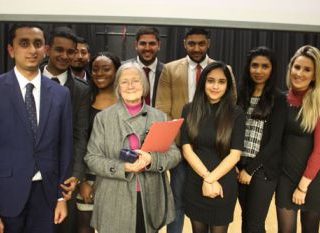Baroness Hale of Richmond: Lady Law Lord
Hosted by the City University London Law Society, more than 300 students turned out to listen to a talk delivered by Brenda Marjorie Hale, Baroness Hale of Richmond, Deputy President of the Supreme Court of the United Kingdom. Airianna Mapp fills us in on the evening’s content…

The most powerful statement to take away from Lady Hale’s speech to the Law Society of City University was that all women contemplating a career in law need to remain true to themselves. Too many women come into law thinking they must change the way they act, speak, or think in order to assimilate to the patriarchal, judicial way of thinking. The British law community has always been perceived as a boys’ club and many woman try to adopt a male mentality in order to be successful. In order to effect real change, however, women need to bring their own perspectives and experiences into the legal field with them.
The discussion commenced with a brief glimpse into the past and current activities of Lady Hale, as she ascended to the judiciary and ultimately to the Supreme Court. Lady Hale has been a part of some of the most influential decisions in British law for the last few years, including the meaning of domestic violence given from the case of Yemshaw v London Borough of Hounslow.
Baroness Hale of Richmond noted that a difficulty to being the only Lady Law Lord is the common misconception that she represents the female point of view. “I know many women who disagree with my point of view,” that does not make them incorrect, just different. Women have different experiences, backgrounds and lead varying lives; to be the only women sitting on the Supreme Court encourages her male colleagues to look to her for the female way of thinking and that is incorrect. She noted with disconcertion that in the judiciary there was only a twenty percent female representation. While her appointment to the Supreme Court is an important move towards diversity, Lady Hale did not believe the motivation came from a desire for gender equality. “I was in the right place at the right time,” Lady Hale commented on her appointment. There are many women who could be successful in the higher judiciary they just need to be given the opportunity. During a time when other common law jurisdictions were diversifying, Britain remained steadfast in its male dominated judiciary. Finally, the legal community began to realize women were needed in the judiciary and began to look for qualified females.
Lady Hale was adamant that more diversity in gender, ethnicity, race and sexual orientation on the bench were needed. The Lady Justice did not attempt to soften her words, the main problem stopping women from ascending to the bench is lack of confidence and mental negativity. It is no surprise that life at the bar is difficult. Income is generated from self-employment and there is a lot of stress that comes with that aspect of life at the bar.
Lady Hale noted that neither women taking leave for motherhood nor discrimination were the main problems for lack of gender diversity. It was mainly the lack of financial security causing the difficulty for women. Women tend to prefer having guarantees for their financial situation when raising families and therefore chose to move laterally rather than vertically, with regards to their careers. Instead of remaining self-employed barristers, many women are choosing to align themselves with companies, as in house counsels or even preferring positions as solicitors given the financial security. Women are just as capable of being successful in the judiciary but the belief that their appointments only ‘fill quotas’ is deterring many. Many women choose not to apply for fear of how their appointment will be perceived by the legal community at large. Changes to that perception are slow in coming but necessary to gain more diversity at the judiciary.

Lady Hale noted a criticism to diversifying the bench: more women at the bar will take away the merit of appointments and lead to a system based on reaching targets rather than endorsing quality. Lady Hale efficiently and succinctly eliminated that perception. Encouraging more women to seek judicial appointments will only broaden the group of qualified candidates. Women who are applying know they are able to do the job; successful female appointees are only given the job based on their qualifications and the general understanding amongst their colleagues that they are capable of this position.
Lady Hale is encouraging more women to apply to judicial appointments and erase their own negative belief about not being appointed for merit. There are a great number of qualified women but they must remain confident in their abilities and actually apply for judicial appointment. More diversity will not diminish the quality and merit of the candidates but actually enrich the system. Maintaining targets, however, will negatively impact the judiciary.
As Britain moves into the future it is important to recognize where we were, where we are and how we should proceed. The judiciary must remain a strong uninfluenced body capable of making decisions on difficult points of law. No longer is it the focus to maintain the status quo but it is important to have diversity and superior judicial intellect. The United Kingdom remains one of the strongest role models for legal systems around the world. With both the Chief Justices of Canada and New Zealand being female, and many judiciaries becoming more diverse it does make the world wonder when Britain will modernize with the times.
Airianna Mapp is a student on the Graduate LLB programme and holds a degree in Political Science from Western University, Canada.

